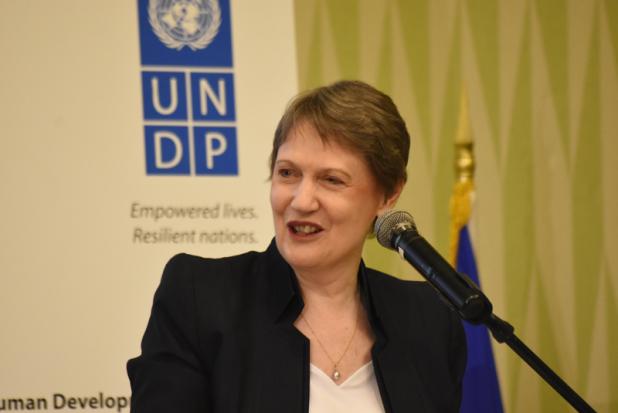
Helen Clark, UNDP Administrator, addressing the launch of the Human Development Report (HDR) for the Caribbean, launched at Hilton Barbados Resort
Caribbean HDR launched: Focus on boosting resilience
Wed, 09/14/2016 - 12:00am
By:
Tanya Lightbourne
Caribbean countries need a new generation of public policies to increase gains in the economic, social and environmental fronts while boosting climate and financial resilience and protecting people throughout their life cycles, says the United Nations Development Programme’s (UNDP) Human Development Report (HDR) for the Caribbean.
On Monday, the 2016 Report “Multidimensional Progress: Human Resilience Beyond Income”, was officially launched at the Hilton Barbados Resort. It highlights the need to rethink the methods for ranking development in the region’s countries that go beyond per capita income, economic growth rates and Gross Domestic Product (GDP).
Administrator of the UNDP, Helen Clark revealed that the inspiration for this report authored by Warren Benfield, Compton Bourne and Kenroy Roach, comes from the desire of Caribbean leaders to have metrics for assessing development which better reflect the unique vulnerabilities and challenges faced by middle-income Small Island Developing States (SIDS).
She said that central to the report is the concept of multidimensional progress which enlarges the idea of human development to include other important determinants of well-being.
“These include access to assets, social protection and care systems, and decent work – all highly relevant to the Caribbean. The report also makes it clear that multidimensional progress cannot be made at the expense of people’s rights or of environmental sustainability. The report emphasises that economic growth and multidimensional progress can be mutually reinforcing. Growth provides the resources which can be channelled to investments in areas critical to multidimensional progress, such as building inclusive labour markets and social protection and care systems. These investments, in turn, help build people’s resilience to shocks and the foundation for future growth.”
The UNDP Administrator also revealed that the report underlines the importance of building resilience to shocks, “not least with respect to preventing people from sliding back into poverty”.
According to her, education and employment help people move out of poverty, but good policies and investments are needed to keep them above the poverty line. She noted that these can include social protection systems operating throughout the life cycle; expansion of systems of care for children, older people, and people with disabilities; expanding access to physical and financial assets; and continual improvements in people’s skills to improve work prospects, including for women and youth.
“The report examines human development gains in the Caribbean to date, and discusses how the region’s structural and external challenges, such as high debt, low growth, a volatile global economy, and frequent natural disasters, combine to put these gains at risk.
This is an especially important perspective for the Caribbean right now. The region is showing signs of recovery from the global financial crisis. After a decade of low growth, however, it will be important for Caribbean countries to implement policies which protect development gains, especially for women, disabled persons, youth, and children. Adequate investments need to be made in areas like social protection, employment generation, and building climate resilient infrastructure,” Clark said.
Vulnerabilities
The Caribbean HDR focuses on several groups and their “vulnerabilities”, which accumulate over a life cycle hindering people’s capacity to fulfil their potential and also to leave poverty behind.
Women are disadvantaged in the labour market, with lower level and lower paying jobs than men in the Caribbean, according to the report.
“Although women head nearly half of the Caribbean households, the participation of women in senior managerial jobs is still limited to less than one quarter of these jobs in all researched Caribbean countries, with the exceptions of St. Vincent and the Grenadines and Barbados…
In the Caribbean, women are more affected by unemployment than men, although the gap is reducing over time, the report shows. Between 2000 and 2013, the labour force participation rate of women aged 15-64 increased by 2.2 percent whilst that of men decreased by 2.5 percent. However, gender differences are large with 59.3 percent of women in labour force versus 78.7 percent for men.”
Acknowledging that youth are also a critical group in vulnerability, the Caribbean report stated that youth unemployment is a common challenge for both women and men, as rates range between 18 percent and 47 percent except in Trinidad and Tobago where it is 10 percent.
It was also recognised that Caribbean youth are underachieving educationally at the secondary school level, and this is associated with poverty, juvenile crime and violence – influenced by exposure to violence at home, in the community and in juvenile gangs.
“Young males are both the main victims and the main perpetrators of crime in the Caribbean, and violence is starting at younger ages than in the past.”
